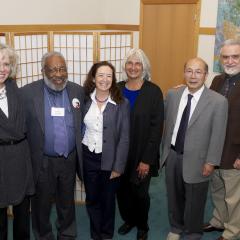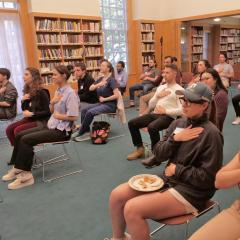Pam Kircher: In the End, Relationships Matter Most
Pam Kircher delivered these remarks at the Center’s 5th annual Ikeda Forum for Intercultural Dialogue. Held September 20, 2008, the Forum was called “Living with Mortality: How Our Experiences with Death Change Us.” Dr. Kircher is a family physician and hospice doctor in Durango, Colorado. She is the author of Love is the Link.
*
I thought what would be useful this afternoon would be to give you a glimpse of how I am seeing medicine change because of changing attitudes toward death and dying. And then I’ll share my own views about how I see our society changing.
The first thing I’d like to do is offer a little perspective. One hundred years ago, doctors didn’t really have a lot to offer patients. Doctors were compassionate, they were supportive, but all of the technology – the antibiotics and all the other meds – just wasn’t there yet. Everything changed in the 1940s and ‘50s, when antibiotics were discovered and the technology began to grow. And there came this idea that somehow we were getting so good at treating life-threatening illness that death was a failure on the part of the medical profession. Now it sounds absurd, because we know we’re all going to die, but nevertheless, the common phrase was “Not on my watch, they aren’t!” So there was that sense of, no, not while I’m taking care of someone are they going to die.
Along with that, came the idea that it was best for people to die in the hospital, first, and then, as we developed ICUs, it was believed that to die in the ICU would be even better, because there they could really be helped and live as long as possible. Well, back in the ‘60s, in the ICU, loved ones got to visit exactly 15 minutes twice a day, and each visit was a scheduled event. If somebody wasn’t awake, too bad! And medical students were taught that they should never tell a person that they were terminally ill. That was to be kept from them. It was considered bad for them to know. And they also cautioned family members not to talk to them [about their condition].
Well, after what you learned from this morning’s dialogue, where many of you shared your profound experiences with dying loved ones, you can appreciate that almost everyone who died in this country was depressed! Because how sad would that be — to be completely isolated at death and to have no one there to talk with about what you really care about?
So it was in that setting in the late ‘60s that Dr. Elizabeth Kubler Ross, in Chicago, began to actually talk to dying people. It was considered just awful by the medical profession that she did this. She did it anyway. And what she discovered was that this process of talking helped them to resolve their approaching death; it helped them to say goodbye.
It wasn’t until 1976 that the first hospice was built in this country. It’s only 30 years old!Most of you here today have had some kind of experience with hospice. But it wasn’t until 1976 that the first hospice was built in this country. It’s only 30 years old! There were no hospices before 1976. [Responding to a comment from the audience] That’s right, they existed in England, but not in this country. In fact, when Dr. Kubler Ross wanted to start one, she went to England to see Dame Cicely Saunders to find out how to do it. We were not the inventors, then, but we were the beneficiaries of people who went before us.
Since hospice started here in the mid-‘70s, the movement has just burgeoned. There’s one in every town in this country. And the main reason for that is that people have said they want quality of life more than quantity of life, simply being alive for as many minutes, days, or years as possible. They want quality of life. And they want to call the shots for themselves. And with hospice, loved ones are actually present during the last stages of life. These changes are impacting medicine in a couple ways.
First of all, people saying “I want to make my own choices” reverses the idea that doctors are the ones who tell you what you need, what you will do, what pills you will take, what treatments you will have. The doctor becomes your consultant, using their expertise to tell you what’s available to you. Today, people are actually making their own healthcare decisions. That’s been a huge change in medicine.
The hospice movement has enabled people who are dying to say goodbye to their loved ones, and for loved ones to see what we do when we are getting close to death.
Pam Kircher
And the hospice movement has also enabled people who are dying to say goodbye to their loved ones, and for loved ones to see what we do when we are getting close to death. What kinds of questions do we have? What does a life review mean? And we find that those who have been with loved ones as they are dying often make changes in their own lives as a result. So hospice is having a huge impact, not only on the medical profession, but on the country and the world as well.
Another important thing, in terms of the medical profession, is that when people are with loved ones as they are dying, these loved ones often witness mysterious experiences that were mostly unknown before, because patients were in an ICU and would be told that they had had a hallucination, and that they just should not talk about it. These powerful kinds of experiences, which sometimes share characteristics with what we know as Near Death Experiences, are now something that families think about! And they wonder, what is the meaning of this? And because of how common this is, medicine is now beginning to look at research around this and to ask: Well, what does this mean?
One result is that there is more questioning about the nature of consciousness. Where is consciousness located? Where does it originate? What are its limits? New research is happening. It’s an exciting time to be in medicine.
I want to add an observation about my brothers and sisters in the medical profession. We cannot help but listen to our patients who talk about the meaning of life and the importance of relationships and to ask ourselves: Are we such workaholics that we can’t have relationships? The experience of patients is going to change medicine, too, because medical professionals deserve to have lives as well. So those are the changes I see in the medical profession.
Now I’d like to take a larger view. I have spent a lot of time with people who are close to death and with the loved ones who are around those people who are dying. What I’ve learned is that when we are dying, we generally are not concerned with how much money we have made. We’re generally not concerned about the degrees we have and the stuff we own. What we care about is the relationships we have. We ask ourselves: Have we done forgiveness? Have we been loving? When this becomes the theme of everyone, or at least the theme of the majority, I see our country changing enormously. I see us less concerned with material possessions and success, and more concerned with living lives of simplicity, lives of connectedness, lives that involve nature. I see us asking deeper questions about the meaning of life, pursuing ideas of spirituality, and continuing to learn throughout our lives. That’s what I’ve learned from people who are dying. That’s my take-home message.
Finally, I would like you to imagine what this country, this world, will be like, when that attitude becomes the norm. What will the world be like when the average person cares above all about relationships, learning, and finding deep meaning in life? I’m looking forward to finding out.

